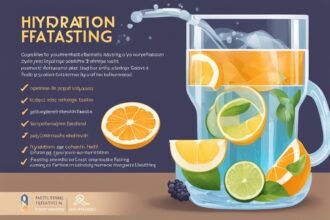Hey there, fasting enthusiasts! If you’re diving into the world of intermittent fasting, water fasting, or any other fasting regimen, you’ve probably got a ton of questions. One of the most critical—and often overlooked—aspects is hydration. Staying properly hydrated can make or break your fasting experience, impacting everything from energy levels to mental clarity. In this comprehensive guide, we’ll explore why hydration is a cornerstone of successful fasting, share actionable fasting tips, and back it up with science. Whether you’re a beginner or a seasoned faster, these insights will help you navigate hydration challenges and optimize your health journey.
Why Hydration Matters During Fasting
When you fast, your body isn’t just skipping meals—it’s undergoing a metabolic shift. Without food intake, your body relies on stored energy, and water plays a pivotal role in these processes. Hydration supports detoxification, helps regulate body temperature, and keeps your organs functioning smoothly. According to research, even mild dehydration can lead to fatigue, headaches, and impaired cognitive function (Pross et al., 2014). During fasting, when you’re already pushing your body out of its comfort zone, dehydration can amplify feelings of hunger and irritability, making it harder to stick to your plan. So, mastering hydration isn’t just a side note—it’s one of the top fasting tips for success.
How Fasting Affects Your Body’s Water Balance
Fasting changes how your body manages fluids. Normally, a significant portion of your daily water intake comes from food—think fruits, vegetables, and soups. When you’re fasting, that source is cut off, so you need to compensate by drinking more. Additionally, during the initial stages of fasting, your body depletes glycogen stores in the liver and muscles, which are bound to water. This leads to a rapid loss of water weight, sometimes 1-2 liters in the first few days (Kerndt et al., 1982). While this might sound like a win on the scale, it also means you’re at a higher risk of dehydration if you’re not mindful. Understanding this shift is key to implementing effective hydration strategies as part of your fasting routine.
Practical Fasting Tips for Staying Hydrated
Now that we’ve covered the why, let’s get into the how. Staying hydrated during fasting doesn’t have to be complicated, but it does require intention. Here are some practical fasting tips to ensure you’re getting enough fluids without breaking your fast or feeling overwhelmed.
- Start Your Day with Water: As soon as you wake up, drink a large glass of water. This kickstarts hydration and replenishes fluids lost overnight. Aim for 16-20 ounces if possible.
- Set Reminders: Use a phone app or sticky notes to remind yourself to sip water throughout the day. It’s easy to forget when you’re busy or distracted by fasting hunger pangs.
- Carry a Reusable Bottle: Keep a water bottle with you at all times. Having it in sight serves as a visual cue to drink, and it’s an eco-friendly way to stay on track with your fasting hydration goals.
- Flavor Naturally (If Allowed): If plain water feels boring and your fasting protocol permits, add a splash of lemon or cucumber for taste. Just avoid sweeteners or calorie-containing additives.
Electrolytes: The Hidden Key to Hydration
Water alone isn’t always enough, especially during extended fasts. Electrolytes like sodium, potassium, and magnesium are crucial for maintaining fluid balance, nerve function, and muscle health. When you fast, especially for more than 24 hours, your body can lose these minerals through urine and sweat, leading to symptoms like dizziness or cramps (Institute of Medicine, 2005). Adding a pinch of high-quality sea salt to your water or sipping on an electrolyte solution (without sugar or artificial additives) can be a game-changer. This is one of those fasting tips for beginners that often gets missed but can significantly improve your experience.
Common Hydration Mistakes to Avoid While Fasting
Even with the best intentions, it’s easy to slip up on hydration during fasting. Let’s talk about some pitfalls and how to dodge them with smart fasting advice.
- Waiting Until You’re Thirsty: Thirst is a late indicator of dehydration. By the time you feel parched, your body is already in need. Drink proactively instead of reactively.
- Overdoing Caffeine: While black coffee or tea is often allowed during fasting, too much caffeine can act as a diuretic, increasing fluid loss. Limit intake to 1-2 cups daily (Nehlig, 1999).
- Ignoring Electrolyte Needs: As mentioned earlier, skipping electrolytes during longer fasts can lead to imbalances. Don’t assume water alone will cut it.
- Drinking Too Much at Once: Chugging large amounts of water in one go can overwhelm your system and lead to discomfort. Sip consistently throughout the day for better absorption.
Signs of Dehydration to Watch Out For
Knowing how to spot dehydration early is one of the most important fasting tips for health. Your body will send signals if it’s not getting enough fluids, and during fasting, these can be mistaken for hunger or fatigue. Common signs include dry mouth, dark urine, headaches, and lethargy. More severe dehydration can cause rapid heartbeat or confusion, which requires immediate attention (Sawka et al., 2015). If you notice any of these, break your fast if necessary and rehydrate slowly. Listening to your body is critical—fasting should never come at the cost of your well-being.
Staying ahead of dehydration also means being aware of environmental factors. If you’re fasting in hot weather or engaging in physical activity, your fluid needs increase. A study by the American College of Sports Medicine notes that sweat loss during exercise can exacerbate dehydration risks during fasting (Sawka et al., 2007). Adjust your water intake accordingly and consider shorter fasting windows during intense conditions. These intermittent fasting tips can help you adapt to different scenarios without compromising your health.
In wrapping up, hydration is the unsung hero of any fasting journey. It’s not just about drinking water—it’s about understanding your body’s needs, balancing electrolytes, and avoiding common mistakes. By incorporating these fasting tips, you’re setting yourself up for a smoother, more sustainable experience. Remember, fasting is a tool for wellness, not punishment. So, prioritize hydration, listen to your body, and don’t hesitate to adjust as needed. Whether you’re exploring fasting for weight loss or spiritual reasons, staying hydrated will keep you energized and focused on your goals. Got any hydration tricks that work for you? Drop them in the comments—I’d love to hear how you’re making fasting work for you!
References
- Institute of Medicine. (2005). Dietary Reference Intakes for Water, Potassium, Sodium, Chloride, and Sulfate. National Academies Press.
- Kerndt, P. R., Naughton, J. L., Driscoll, C. E., & Loxterkamp, D. A. (1982). Fasting: The history, pathophysiology and complications. Western Journal of Medicine, 137(5), 379–399.
- Nehlig, A. (1999). Coffee, tea, chocolate, and the brain. Nutrition Reviews, 57(2), 73–75.
- Pross, N., Demazières, A., Girard, N., Barnouin, R., Metzger, D., Klein, A., … & Guelinckx, I. (2014). Effects of changes in water intake on mood of high and low drinkers. PLoS ONE, 9(4), e94754.
- Sawka, M. N., Burke, L. M., Eichner, E. R., Maughan, R. J., Montain, S. J., & Stachenfeld, N. S. (2007). American College of Sports Medicine position stand: Exercise and fluid replacement. Medicine & Science in Sports & Exercise, 39(2), 377–390.
- Sawka, M. N., Cheuvront, S. N., & Kenefick, R. W. (2015). Hypohydration and human performance: Impact of environment and physiological mechanisms. Sports Medicine, 45(Suppl 1), S51–S60.






